The Jazz brass, coaches and owner have done three things well in the post Stockton-to-Malone era:
I. The first thing that the Jazz brass (and co.) has done well is they've established a winning formula, and have enjoyed a consistency that other franchises have lacked. While this has the drawback at some level of inherent stagnancy, the NBA mandated rules changes have kept the Jazz coaches on their toes. One particular rule change which threw a major wrench in the system was the removal of the previous Illegal defense rules. Now Zone Defenses are allowed -- even pseudo-Zones are hard for the Jazz to handle as it's man-to-man defense, but an extra guy to rove around and get in passing lanes -- daring the pound it inside Jazz to shoot from outside. (This was particularly difficult for the Jazz to do during December of that 2007-2008 season, which resulted in many losses)
The Zone Defense friendly NBA forced the hand of the Jazz brass and they have endeavored to start playing 5 on 5 basketball on offense for the first time ever (but more on that later). They needed to avoid Zone defenses in order to properly run their offensive sets. Previous versions of the Jazz would run their forward based offensive sets (Malone, Dantley, Bailey) and involve strong guard play all while the center fell asleep at the top of the key.
This has always been the case as the Jazz used to park Mark Eaton up at the top of the circle while he watched the finesse guys do their thing. Then Greg Ostertag came in and was able to use his height to exploit a high-low passing game inside. If you did that now, no one would follow Mark or Greg outside, and the paint would get clogged very quickly. To counter that the Jazz have further evolved by getting one of the few true bigmen (check out his rebounding games in the playoffs if you don't believe me that he's a bigman) who has a very legit three point shot -- Mehmet Okur. While the NBA has made several rule changes since the Stockton-to-Malone era, the evolution of the Jazz sets has been sped along because of smart roster moves.
II. The second thing that the Jazz brass (particularly the coaches) have done well is that they've tried to learn from their mistakes. Often Stockton was the only guy on the floor who could get the job done; and often, he was the best player on the floor. All too often (save for that elimination game 4th quarter vs. the Rockets where it was Stockton vs. Houston); unfortunately John didn't call his own number enough -- and that hurt the team. What have the Jazz done now? They've got a good passer and floor leader at the point guard -- but someone who is ultimately the most confident in his own abilities. We've had Deron for three seasons now, as we know that when it counts he's not afraid to be 'The Man' -- something Stockton always deferred to Karl (who, honestly, was not as clutch) about.
Another example happens to be expanding the game to involve more people on offense. At their most dangerous the Stockton-to-Malone teams were filled with subordinates like Hornacek and Russell, or Bailey and Griffith. Never did they fully get a chance to have 5 good offensive players on the floor at the same time (thanks, Rony Seikaly -- you could have really helped against Michael Jordan and the Chicago Bulls back then). It's hard to win titles playing 4 on 5.
In order to prevent the picker getting immediately double teamed by bigmen the Jazz need to lure out a bigman outside. Chicken and egg thing with Point I and Point II -- but that displays how inter-related things are: in order to learn from your mistakes you have to have a winning game plan. Thus, if the Jazz wanted to keep relying on forward based offensive scoring sets from the paint, some tweaks were going to be needed to be made.
III. The final thing that they have done well is that they've been able to key in, identify and get similar types of players on the roster -- attempting for coax lightning to strike twice. The obvious comparisons exist -- Carlos Boozer plays like an older, jump shooting Malone. Deron Williams is an adept passing lead guard who is clutch at the end of games, like Stockton. As always, it's more than just replacing Stockton and Malone.
| Then: | Now: | Difference: |
| John Stockton | Deron Williams | Not better: but more willing to step up in crunch time |
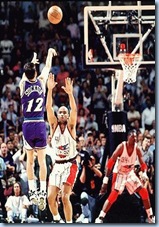 | 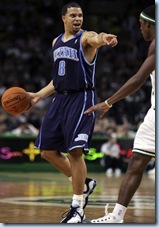 | Stockton was the consummate professional and floor leader. Possessing not just physical tools (like good health and excellent stamina), he also had vast amounts of Basketball IQ -- essentially being another coach on the floor. There would be no success without John. Similarly, Deron Williams is the heart of this version of the Jazz. He is adept at passing (had over 10 apg in his 2nd NBA season, John didn't break that barrier until his 4th). He's not the coach on the floor though, but the Quarterback who calls his own plays -- and is much more willing to do it himself. Sadly, the Jazz could have used a more selfish version of John Stockton. They may have the next best thing in Deron Williams. |
| Jeff Hornacek | Kyle Korver | Gives up floor game and passing for a more min/maxed player |
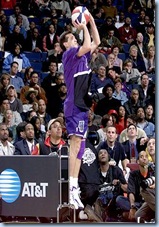 |  | Jeff Hornacek, some people forget, was an All-Star for the West. He was the principle piece that the Sixers got back for trading Barkley -- and all he did was put up 19 ppg (.47/.39/.87), 7 apg, and 2 spg in return. Not too shabby. Hornacek had every shot, and was a much more skilled NBA player. His age and lingering injuries prevented him from being a great defender for the Jazz. Kyle Korver, also acquired in a mid-season trade from the Sixers, is more of a specialist. He is statistically a better three point shooter and free throw shooter. Over this last season Kover received shooting training with Hornacek -- and Jeff admits in his 'aw shucks' type of way that Kyle is a really great shooter, maybe better than Jeff. Jeff brought more to the table though and started. |
| Bryon Russell | Andrei Kirilenko | Better: much more creative and a great shot blocker |
 | 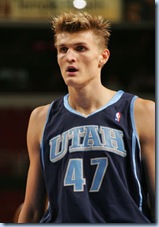 | Before being emasculated by Jordan in the finals Russell was a confident and competent forward who was the best defensive stopper on the Jazz who could run, dunk, do whatever was asked of him, and unassumingly hit threes just when the Jazz needed them. Sound like anyone we know? Andrei is more versatile -- playing everything but center in the playoffs for us between 2006-2007 and 2007-2008; though, let's not forget that in 1998-1999 Russell had to guard Chris Webber in the playoffs due to foul trouble. Like Russell, AK-47 always has to guard to other teams' best offensive player and as often as he gets beat, he comes up with a timely deflection, steal, or block at a more critical juncture in the game. His offensive ability is truncated in his role with the Jazz, but is the most talented player on the team. |
| Karl Malone | Carlos Boozer | Worse: but possibly owns more left-handed post moves though |
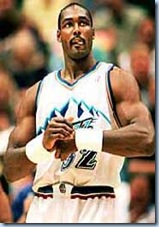 | 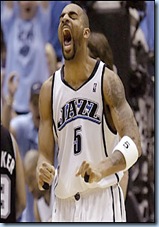 | Carlos Boozer is a beast by today's standards. (at least in the regular season) If you put Karl Malone at his peak in today's game he would own all of these passive, physical play avoiding bigmen. (Seriously, Amare Stoudemire never step on the same court against Charles Oakley.) Both have (at least in the eyes of jaded Jazz fans) built a reputation for not being able to equal their production in the playoffs. Unfortunately for Boozer, his drop off is so severe that it's pure folly to even talk about these two forwards in the same breath. If you want to really get a picture of how ridiculous the comparison is then read this. |
| Antoine Carr | Paul Millsap | The same: the only difference is age and experience vs. youth |
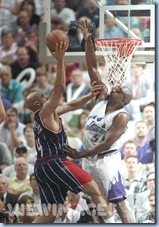 |  | The "Big Dawg" was taller and at that stage, a very savvy veteran who had all the sneaky, esoteric knowledge on how to get away with fouls. Millsap gets called for a ton of fouls -- though they are essentially the same player. Millsap is younger, has some upside, and has a lot more energy and vigor. Both had surprisingly developed offensive games -- but mostly scored close to the basket, often on put backs / tip ins. Carr was a great bench guy for any playoff team, who defended the paint, got boards and blocked some shots. He even had a 20 point game in the NBA finals once. It's not impossible to see Millsap do that well. |
| Howard Eisley | Brevin Knight | Better: Knight + Price > Eisley + Vaughn |
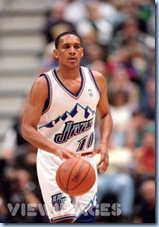 | 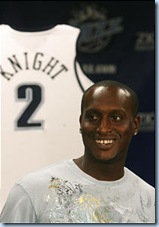 | Eisley's career before the Jazz was nothing to write home about, and his NBA career after the Jazz was almost as pathetic as Shandon's was. Because of this many people fail to realize that he was the best back-up point guard the Jazz have ever had since John Stockton was coming off the bench. He could push the ball up the floor, knew all of the sets, was active defensively and was able to shoot the three with deadly accuracy and even hit game winners. That game winner that Deron had vs. the Cavs last season? Well, Eisley used to do that type of thing back for the Jazz in 1998. While there is little chance for Knight to be as good all-around as Howard was for the Jazz, Knight is a very solid veteran who can run a club, never turns the ball over, and is a good steals guy. This looks like another downgrade; however I'd take Knight and Price (basically a younger, more exciting Howard Eisley with less playmaking and more highlight making skills) over Eisley and Jaques Vaughn any day of the week. |
| Shandon Anderson | Ronnie Brewer | Better: by sheer virtue of Brewer being taller and able to play the 1, 2 or 3 |
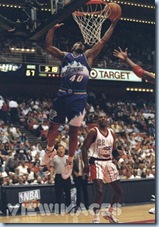 | 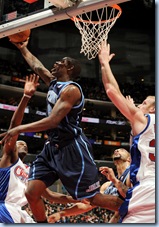 | Shandon Anderson was a young, athletic, defensive minded player who played within his limitations. He never tried to become an outside bomber. His bread and butter was to sneak around and find an open spot on the floor as the other team was concentrating on the other guys (Stockton, Hornacek and Malone) more than they were on him. He turned hard cuts into layups and dunks. Ronnie Brewer is much the same, being an offensive opportunist using his speed, size and athleticism to get easy dunks as the defense pays him no attention. Both benefited from playing with eager passers (Stockton, Hornacek and Malone for Shandon; Williams, Kirilenko and Boozer for Ronnie). Both are the 2nd member of their families to be part of the NBA (Shandon's older brother, and Ronnie's dad both played). Ronnie is longer, faster and has top 5% NBA athleticism (as seen in the pre-draft combine). His shot is broken, but appears to give more to the Jazz than Shandon did -- for one thing, Ronnie starts. |
| Greg Foster | Mehmet Okur | Better: and it's not even close |
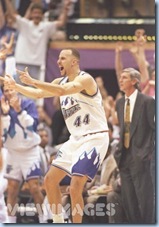 |  | Foster was an occasional starter during the two finals seasons, managing to do so in over 50 games. Okur is our full-time starting center. Both were outside shooting bigmen who were not regarded as big-time rebounders. Memo is a much better rebounder, defender, outside shooter, inside player, and is a serious playoff perform who does all the clutch things you need to win (game winners, or offensive rebounds). Foster was a better dunker -- and both guys are some crappy fight in them. Foster getting into it with the Lakers' Rick Fox, and Memo coming close to throwing down on Juwan Howard among others. Foster was an okay player, but was very annoying in that Sasha Vujacic type of way. Memo has been an All-Star and is a serious upgrade for the Jazz. |
| Adam Keefe | Matt Harpring | Better: and also a better fitting role for this type of player |
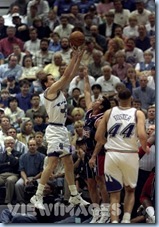 | 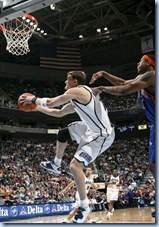 | I guess we need a frame of reference when bad mouthing our own players. Adam Keefe used to start on one of our NBA Finals teams. (and play 25.6 mpg!!!) How insane is that? Keefe, who may be a better beach volleyball player than basketball player, couldn't shoot, and hardly ever caught passes. At least those are two things that Matt Harpring does (sometimes). They both were solid rebounders from the small forward spot, and both did not have three point range. Both used to get torched on defense -- but at least Harpring occasionally has one of those games where he gets 14 points, 1 steal and 5 rebounds. Keefe didn't even give us that as a starter. Harpring is a good bench guy. |
| Chris Morris | C.J. Miles | Not Better, Not Worse: Anything we do get will be better though |
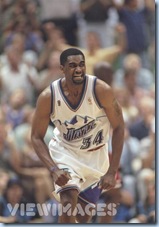 | 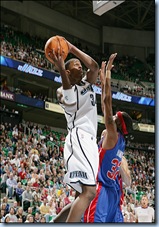 | By the time Chris Morris made his way the Utah, he was a serious NBA performer who could put the ball in the basket. After three NBA seasons C.J. Miles is a guy who can't get off the bench, but who could one day be a serious NBA player. Both are taking lesser roles to play here -- Morris was a starter in New Jersey; and C.J. Miles could start for some teams (or at least, get more playing time). Both have legit three point range and can bust out for some nasty jams. Both have had clashes with Jerry Sloan -- especially over their roles. Right now we can only hope that C.J. can one day become the player that Chris Morris was before coming to the Jazz. If not, then whatever, we still have Morris Almond . . . |
The Jazz brass has done a more than adequate job of emulating the roster of those Finals teams. Those finals teams sported a good mix of talent -- two Olympians, who were also All-Stars mixed in with another former All-Star and a variety of (mostly older) veteran role players. There were no specialists off the bench save for Foster who could hit an outside jumper better than most centers in that era. This team currently has three Olympians, an All-Star mixed in with two other former All-Stars (and one to be in Deron Williams). The bench is almost exclusively comprised of specialists -- Korver is the shooter, Harpring is the hustle guy, Millsap is the paint terror. There have been improvements on all major archetypes save for the fact that Morris/Miles, Carr/Millsap and Hornacek/Korver are all pretty much washes. Okur is clearly better than Foster and while Stockton is ahead of Williams in career ability, Deron Williams is far from a bad player on any given playoff game. Malone destroys Boozer, but the overall talent is upgraded. Kudos to the Jazz for being able to (at least on paper) recreate their championship contending team. Is that all? Is this team NBA Finals worthy?
One large piece is missing . . . you know, a big (7 feet tall at least), rebounding and shot blocking guy. It's a roughly Greg Ostertag sized hole. A Mark Eaton or Ostertag -- something the Jazz has always had the advantage of having, is just not an archetype that the Jazz Brass has been able to duplicate on this version of the team. Three potential prospects exist though -- one is an American born, 7'0, 19 year old Greek who can block shots, but is more likely to make them; another is a 7'1, skinny Croatian who is far removed from playing in the NBA; and the last is a 7'1 Ukrainian who has a questionable work ethic. The previous Jazz teams had to fight against the passage of time. The limiting reagent in this equation happens to be the salary cap.
Compared to those glory year teams, our current roster is better -- but we are behind in the big defensive galoot department. Does that mean that the one guy who is hated for his play, but loved for his goofiness (Ostertag) is the dividing line between serious championship contender and what the Jazz currently have? Essentially, this appears to be more truth than fiction -- as the only major weakness exists as a lack of a shot blocking presence stationed in the paint. Ideally internal improvement of our young centers will satisfy this component -- we do not need a quantum leap in center ability, we just need to get Kosta or Kyrylo to channel their inner-Ostertag. And then we'll be back in the promised land.

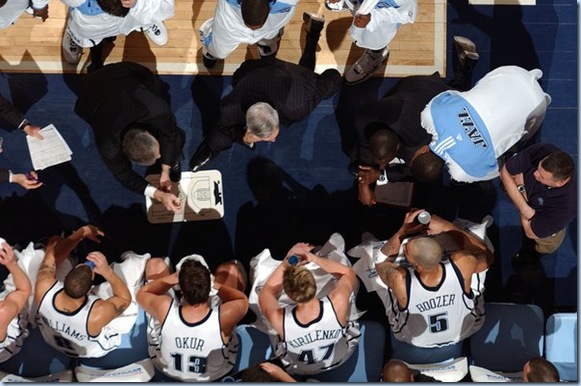
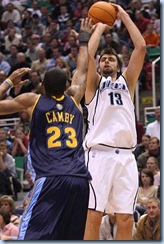
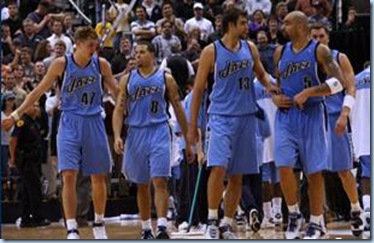

0 comments:
Post a Comment